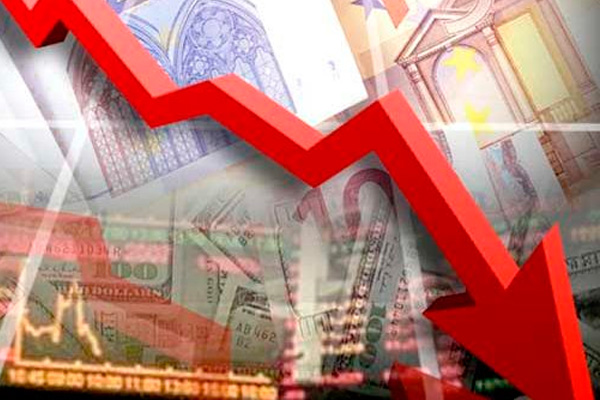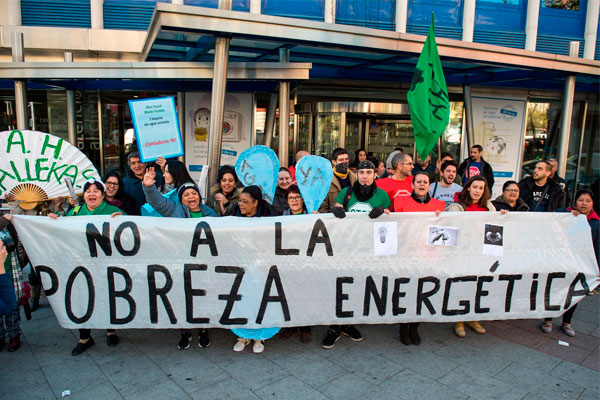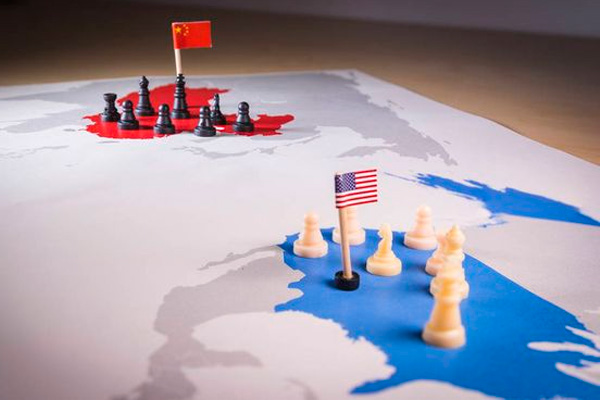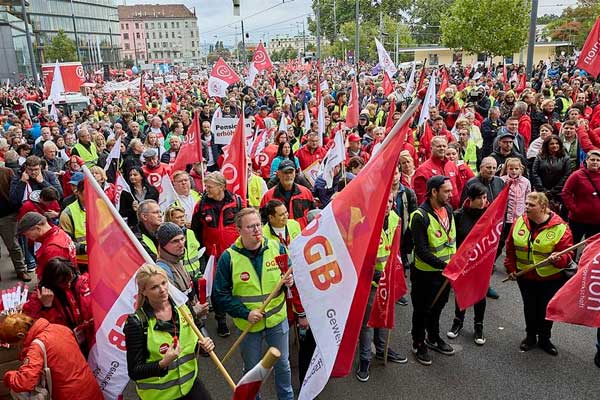Capitalism is facing an economic catastrophe. Although some try to justify it with the imperialist war in Ukraine, the reality is that the war is only deepening the deep imbalances and problems that the world economy was already suffering. The economic chaos that threatens us, and of which more and more media are warning, highlights the incapacity of the capitalists and their governments to resolve the serious contradictions that their system is accumulating.
In addition to the prospects of recession raised by numerous international organizations such as the IMF and the OECD, there are other major problems: Runaway inflation that is plunging millions of people into misery and threatens a prolonged situation of stagflation; an unprecedented public and private debt, 296 trillion dollars, 350% of world GDP, which did not exist when the 2008 crisis broke out and which has reduced the margin of manoeuvre of governments and central banks to a minimum; or the bursting of different speculative bubbles in the stock markets and the public debt market, from the real estate sector to cryptocurrencies. Added to this are the increasingly dramatic effects of the climate catastrophe on the economy.
The imperialist war in Ukraine is only aggravating the deep contradictions and imbalances that the world economy was already suffering. Capitalism is facing an economic catastrophe.
Crisis of overproduction. Record capitalist profits and misery for the masses.
As in 2008, we are ultimately talking about a crisis of overproduction. Capitalism produces anarchically, desperately seeking short-term corporate profit and in the process expands beyond what the market can absorb. And this is what is again coming to the surface. The inflationary spiral of prices proves it. The big monopolies and investment funds are having a field day speculating on energy or food, making record profits. But there is no shortage of oil, gas, food, or many other resources or commodities. On the contrary!
A good example is food. Despite the brutal price increases in international wholesale markets, 20% in the case of wheat or up to 29% in the case of corn, the FAO has indicated that world cereal production in 2022/2023 will be reduced by only 1.7%, with a surplus of 847.8 million tons. A surplus below 2021, which was a record year, but above 2018, 2019 and 2020. In the case of wheat, whose rise has been blamed on the war in Ukraine, production is expected to reach 787.2 million tons, a new all-time record. The same can be said for oil, gas and other raw materials.
All the suffering generated by this situation in the form of hunger, mass impoverishment, impossibility of heating during this winter, has only one beneficiary- the big multinationals and the banks that are getting richer than ever with the war by resorting to the most obscene speculation. This crisis will throw millions of people into poverty and unemployment, but it is perfectly avoidable with the immense resources and technological advances available to humanity. But not under capitalism.

Economic nationalism and trade war. US on the ropes
The global crisis is fed by the increasingly decisive clash between the great powers and imperialist blocs- the US and China, and their respective allies- who are resorting to economic nationalism and trade wars in a fight to the death for greater market shares, to control sources of raw materials and supply chains and to escape the recessionary dynamic at the expense of others. A battle for economic supremacy that has its natural continuation in the military and geostrategic realm as we see in Ukraine. As Lenin explained, this is the inevitable dynamic under capitalism in its imperialist phase.
Following in the wake of Trump's economic nationalism, the Biden Administration and the Federal Reserve (Fed) have not hesitated to adopt a policy that involves an aggressive trade war against the rest of the world and among others, against some of its major allies. The US Federal Reserve's rate hike and the consequent rise in the value of the dollar, close to 20%, is part of this war.
Its consequences are already visible: the rising cost of the dollar debt of many countries, especially emerging countries, pushing them towards massive defaults and bankruptcies, as has already happened to Sri Lanka, or the collapse of currencies such as the pound or the yen, which have lost 26% and 20% of their value respectively. A situation that in Great Britain, main ally of the US in the imperialist war in Ukraine, has forced the Bank of England to desperately come to the rescue of its economy. The politicians of Washington and the US bourgeoisie are trying to export their crisis and inflation, and to recover economic muscle against China, but they are doing so at the cost of sinking the world and especially their European allies and those of other parts of the world.
The confrontation unleashed against OPEC is another good example of this. The attempts by the US and the EU to control and limit oil prices in order to curb the inflationary escalation have led to a direct clash with Saudi Arabia, the historical ally of US imperialism in the Persian Gulf.
Biden has accused OPEC of throwing itself into Putin's arms, and his State Department is threatening harsh reprisals against the Riyadh regime. But this policy has further isolated the US and the EU internationally, strengthening OPEC's strategic alliance with Russia (and China) in order to maintain high oil prices and its lucrative business. In this context, keeping oil prices high will contribute to deepen the world recession and will especially hit the European allies of US imperialism, very dependent on energy imports.
The deepening of this economic and trade war, of protectionist measures, of rate hikes and devaluations to gain competitiveness on the world market, are pushing towards an increasingly serious recession and even a possible depression. It is the same path followed after the crash of 1929, which in the end led to the World War. Economic nationalism is completely impotent in the face of the collapse of the capitalist economy.
The US is still trying to adopt desperate measures to halt its decline and the rise of the Chinese giant. But the reality is that both the American capitalists and their European and Asian allies continue to make record investments in China in their unbridled quest for greater profits.
In the first eight months of 2022, foreign direct investment in China grew by 16.4%: 58.9% for South Korea, 30.3% for Germany, 26.8% for Japan and 17.2% for the United Kingdom. A reality which shows that, despite the problems China is also suffering, such as its real estate bubble, and the fact that it cannot escape the global crisis affecting capitalism, its economic muscle continues to grow stronger than that of its North American competitor.
Added to all this is the danger of the bursting of the immense speculative bubbles generated during years of massive liquidity injections by the Central Banks.
Credit and debt, as Marxism explains, are instruments to try to circumvent the crisis of overproduction, artificially feeding the expansive cycle and expanding the market beyond its natural limits. The consequences, as seen in the crash of '29 or the financial crisis of 2008, are even more destructive imbalances. And that is also happening now. In the last year there has been a sharp depreciation of global financial assets, far greater than that suffered in 2008, which has meant that in a matter of months 37 trillion euros have vanished from the financial system and the stock markets!! The possibility of a new financial crash is on the table.
At the centre of this crisis is Europe, condemned to continue its decline on the world scene to the benefit of US imperialism. A decline that has been brewing since 2008 and is now taking a qualitative leap. While between 2009 and 2020 the annual growth rate of China was 7.36% and that of the USA 1.38%, in the case of the EU it was a pyrrhic 0.48%. In 2005 the EU accounted for 20% of world GDP. In 2030 it will be reduced to only 10%.
mperialist war in Ukraine is bringing the European continent and Germany, its industrial motor, to a critical point. The break with cheap Russian energy sources, key to its competitiveness, is putting unbearable pressure on German and European industry.
Gas prices have tripled compared to 2021 and increased 10-fold compared to 2019-2020, before the pandemic. In the case of Germany, prices in August increased by 139% over the previous year. Energy costs in Europe have risen from 2% to 12% of GDP, sinking the competitiveness of German and European industry, and putting on the table the destruction of part of it for the benefit of China or the USA. The sharp increase in the EU trade deficit, with record figures since the beginning of the statistical series, makes this clear.
Desperate attempts to seek alternative sources or to cap prices have collided with the reality of the capitalist market. Liquefied Natural Gas (LNG) sold by the USA not only cannot replace Russian gas, but is 4 to 5 times more expensive than the latter, and rising, as a result of the increase in demand. This situation has led industrial prices in Germany, whose industry depends on gas, to soar 46.9% year-on-year in August, the highest increase since the statistical series began in 1949. A situation that is putting the German economy on the ropes: Deutsche Bank is talking about a possible fall in GDP in 2023 of between 3% and 4%, which would be a real economic catastrophe for the entire continent.

A debacle that takes place in the midst of an inflationary spiral: for the first time the EU has had a double-digit inflation rate, 10.2%, and countries such as Holland, Belgium, Poland or the Baltics are already close to or above 20%. The situation, which shows no signs of improving and is already beginning to generate strong social protests, condemns the continent to a fierce class struggle in the coming period.
This situation puts the precariousness of European unity back on the table. Regardless of the speeches and triumphant propaganda of the EU bureaucrats, the reality is that Europe is increasingly divided. The frictions already seen over sanctions against Russia continue to deepen, with each country's nationalist and protectionist measures to cope with the recession getting worse. Every man for himself will plunge Europe into a crisis far worse than the one experienced a decade ago.
The recent criticisms of the EU Commissioner for Competition and other governments against Germany for its multi-million euro aid plan for its industries and large companies, 200,000 million euros (8.4% of German GDP, double that of France or Italy), make this clear. While Germany can afford to act in this way, with a public debt at 68.2% of its GDP, other countries such as France (114.5%), Italy (152.7%) or the Spanish State (116.1%) cannot. Once again, the supposed European solidarity becomes water under the bridge. It is the inevitable consequence of a European unity on capitalist bases.
What is clear to both the Brussels bureaucracy and the different European governments, is who has to pay the consequences of this crisis: the working class.
The European Commission, for example, has approved a series of rules to allow governments to bail out the big energy monopolies[8], as happened in 2008 with the banking sector, and Germany and other countries are already bailing out big companies in the sector with the excuse of the war. On the other hand, the drastic increase in military budgets, beginning with Germany (100,000 million), is representing a fabulous business for the big European arms industries. They are asking the workers to tighten our belts, to prepare for a harsh winter and to accept to freeze to death, while their business goes from strength to strength.
Sooner or later, the unsustainable debt situation, which is already pushing up the risk premiums again, will lead the EU to return to harsh austerity policies with more cuts and adjustments. If it is not openly raised yet, it is because of the real terror of the EU bureaucracy and governments in the face of uncontrollable social outbursts.
The capitalist crisis will lead to a frontal clash between the classes, to massive protests, uprisings and even revolutionary crises. And Europe will be at the center of these processes. The rise of the European ultra-right, with sectors increasingly close to fascism and with a harsh nationalist discourse, reflects the depth of the crisis.

However, what the EU bureaucrats and the European governments really fear, is that this polarization will express itself, and it will do so, in a revolutionary way, with increasingly radicalized and militant strikes, overflowing the trade union bureaucracies, and with explosive movements of the youth and workers through direct action. A breeding ground to draw advanced socialist conclusions, to raise the banner of proletarian internationalism and revolutionary communism.





















































